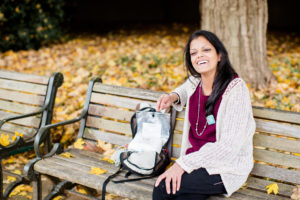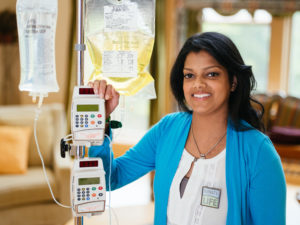
Speaking Topics
 Normal is Not For Everyone
Normal is Not For Everyone- Be Positive Like a Proton
- What is in Your Backpack?
- No More IVs and Tubes
- Everyone is Here for the Food, Right!
- Curiosity – The Ones Who Are Not Afraid to Try It
Normal is Not For Everyone
The Importance of Finding Your Own Normal and Moving Forward
 When Swapna was born with Short Bowel Syndrome 26 years ago, the doctors did not know the prognosis. With not knowing how the future would unfold and the risk of the necessary treatments, Swapna’s family had to learn that this chronic illness was not the end of the world; but rather it was just the beginning.
When Swapna was born with Short Bowel Syndrome 26 years ago, the doctors did not know the prognosis. With not knowing how the future would unfold and the risk of the necessary treatments, Swapna’s family had to learn that this chronic illness was not the end of the world; but rather it was just the beginning.
They made it their “new normal” and went on with life appreciating each day alive and healthy. Swapna soon learned that her “normal” was different than her peers and she would have to constantly adapt to “new normals” in order to survive from going to school with IVs and tubes to finishing college without being able to eat. Rather than complaining and feeling sorry for herself because she couldn’t do what we all love, eat, Swapna instead transformed her hunger into something positive, cooking Food Network inspired meals for friends and family.
It was then, Swapna realized how to use her life story and passion for public speaking to educate others, to advocate for change, and to inspire individuals to overcome their own adversity. Swapna inspires her audience to not let limitations stop them, but rather to find your own normal, learn how to adapt to it for your driven purpose, and use it to move forward in life.
Take Aways:
-
- How to be true to yourself
-
- To not look back and have regrets, but rather look forward at the solution
-
- How to foster and maintain resiliency in the face of adversity
-
- Road blocks are hidden opportunities for personal growth
- What is your “normal?” Are you embracing it?
Be Positive Like a Proton
The Value of a Support System
 Swapna was experiencing one of her hardest hospital stays, 7 weeks in the ICU and 5 major surgeries, when she received a card from one of her best friends, with the joke, “Be positive like a proton,” written inside. The joke brought a smile to Swapna’s face for the first time and inspired her to remain positive during those 7 weeks. The joke still inspires Swapna today and of course makes her laugh, but it taught her the importance of an extended support system.
Swapna was experiencing one of her hardest hospital stays, 7 weeks in the ICU and 5 major surgeries, when she received a card from one of her best friends, with the joke, “Be positive like a proton,” written inside. The joke brought a smile to Swapna’s face for the first time and inspired her to remain positive during those 7 weeks. The joke still inspires Swapna today and of course makes her laugh, but it taught her the importance of an extended support system.
Swapna’s friends and family came to the hospital every day graciously opening up about their lives – the joys and the struggles. Swapna embraced their stories, because they allowed her to jump into their lives and escape her own reality for a few hours. Cheering them on gave her happiness and hope for her own life that one day she will be living life as a young adult again. Swapna shares the power of social support, the power of faith and confidence, and the importance of asking for help, in all aspects of life
Take Aways:
-
- The value of a support system for an individual, group of people, or an organization
-
- How to overcome challenges with grace and efficacy
-
- How to foster and maintain resiliency
-
- You can make a difference in someone’s life
- Make friends and family a priority
What is in Your Backpack?
Living with a Chronic Illness as a Young Adult
 One year, when she was at a New Years Eve Party in college, she was asked by a stranger, “What’s in you backpack?” and if she had alcohol in her backpack to keep her going all night. After being taken aback, Swapna started smiling because the backpack she was wearing carried her IV nutrition and she had to wear it 24/7 to stay alive.
One year, when she was at a New Years Eve Party in college, she was asked by a stranger, “What’s in you backpack?” and if she had alcohol in her backpack to keep her going all night. After being taken aback, Swapna started smiling because the backpack she was wearing carried her IV nutrition and she had to wear it 24/7 to stay alive.
Swapna went to school like her peers, succeeded academically, and aced her serve on the tennis court, all while wearing a backpack carrying her nutritional needs. Swapna made her backpack a part of her and instead of letting it bring her down, she used it as a driving force to move forward.
Living with a chronic illness that involves multiple surgeries, IVs and feeding tubes, can affect your relationships with friends, social outings, and your own hobbies. But, Swapna keeps her audience laughing with examples of her sassiness and spunk as she tells how she still made friends and remained a social butterfly even with a tube hanging out of her shirt. She tells audiences how to not let what is in your backpack (life long hurdles) bring you down.
Take Aways:
-
- How to foster and maintain resiliency
-
- Roadblocks are hidden opportunities for personal growth
-
- Lead by example in your actions and in your attitude
-
- How to move forward and look at the solution rather than the problem
- How to overcome own personal burdens
No More IVs and Tubes
My Transplant Journey
 Swapna had a choice, save her dysfunctional intestine or take it out and have an intestinal transplant. Spoiler alert, she chose the latter. But, it was the hardest decision she has ever made.
Swapna had a choice, save her dysfunctional intestine or take it out and have an intestinal transplant. Spoiler alert, she chose the latter. But, it was the hardest decision she has ever made.
Swapna shares the sequence of complications, and multiple surgeries she had to endure before deciding to have a transplant along with the mental and emotional debate she had with herself before deciding to be listed for an intestinal transplant.
Everyone is Here for the Food, Right!
My Relationship with Food and Eating
 In her 20s, Swapna is learning how to eat for the first time in her life. Swapna’s parents were not allowed to feed her by mouth her first year of life and since birth Swapna has been connected to an IV or feeding tube to get most if not all of her nutrition.
In her 20s, Swapna is learning how to eat for the first time in her life. Swapna’s parents were not allowed to feed her by mouth her first year of life and since birth Swapna has been connected to an IV or feeding tube to get most if not all of her nutrition.
She learned how to eat socially and for the first time gained weight on her own in college, but due to surgical complications, one of the best years of her life was paired with one of the worst years of her life, when she found out she could not eat solid food. Now, after a life-altering intestinal transplant, Swapna has to eat enough calories to maintain her weight and drink enough to stay hydrated, both of which she has never done before without the help of an IV or feeding tube.
Listen to Swapna’s food stories as she explains how she lived 3 years without eating, and the difficulties she now faces trying to learn how to eat as a young adult.
Take Aways:
- The importance of finding a meal plan that works for you
- How to overcome own personal burdens
- Accepting your physical, mental, and emotional limits
Curiosity – The Ones Who Are Not Afraid to Try It
Teamwork with Physicians and Medical Staff
 One of Swapna’s doctor’s in 2011 coined the phrase, “Is that doctor curious?” It became a common phrase to ask if a physician was committed, passionate, and innovative enough to be involved in Swapna’s care because her case is unique and more involved than other patients. These doctors needed to be willing to try new things.
One of Swapna’s doctor’s in 2011 coined the phrase, “Is that doctor curious?” It became a common phrase to ask if a physician was committed, passionate, and innovative enough to be involved in Swapna’s care because her case is unique and more involved than other patients. These doctors needed to be willing to try new things.
Swapna is now fortunate enough to name several curious doctors, nurses, pharmacists, nutritionists, and more who make up her passionate medical team. Medical success is a two-way street, and Swapna is only alive today to tell her story because of the teamwork displayed in and out of the hospital.
However, achieving teamwork is not always easy and especially difficult with multiple hospitals and multiple medical teams across the nation. How do you avoid miscommunication? Swapna’s motivates her audience to be part of a team in any field, to create that pit crew, and to always be curious to change the status quo because it is teamwork paired with curiosity that allows you to make the greatest discoveries.
Other Topics:
Short Bowel Syndrome and a Small Intestine Transplant:
The Medical Perspective (For Medical Professionals and Staff)
Speak Up!:
You are Your Greatest Advocate
CLABSIs – Infection Control
The Importance of Keeping a Central Line Safe, Clean and Secure
